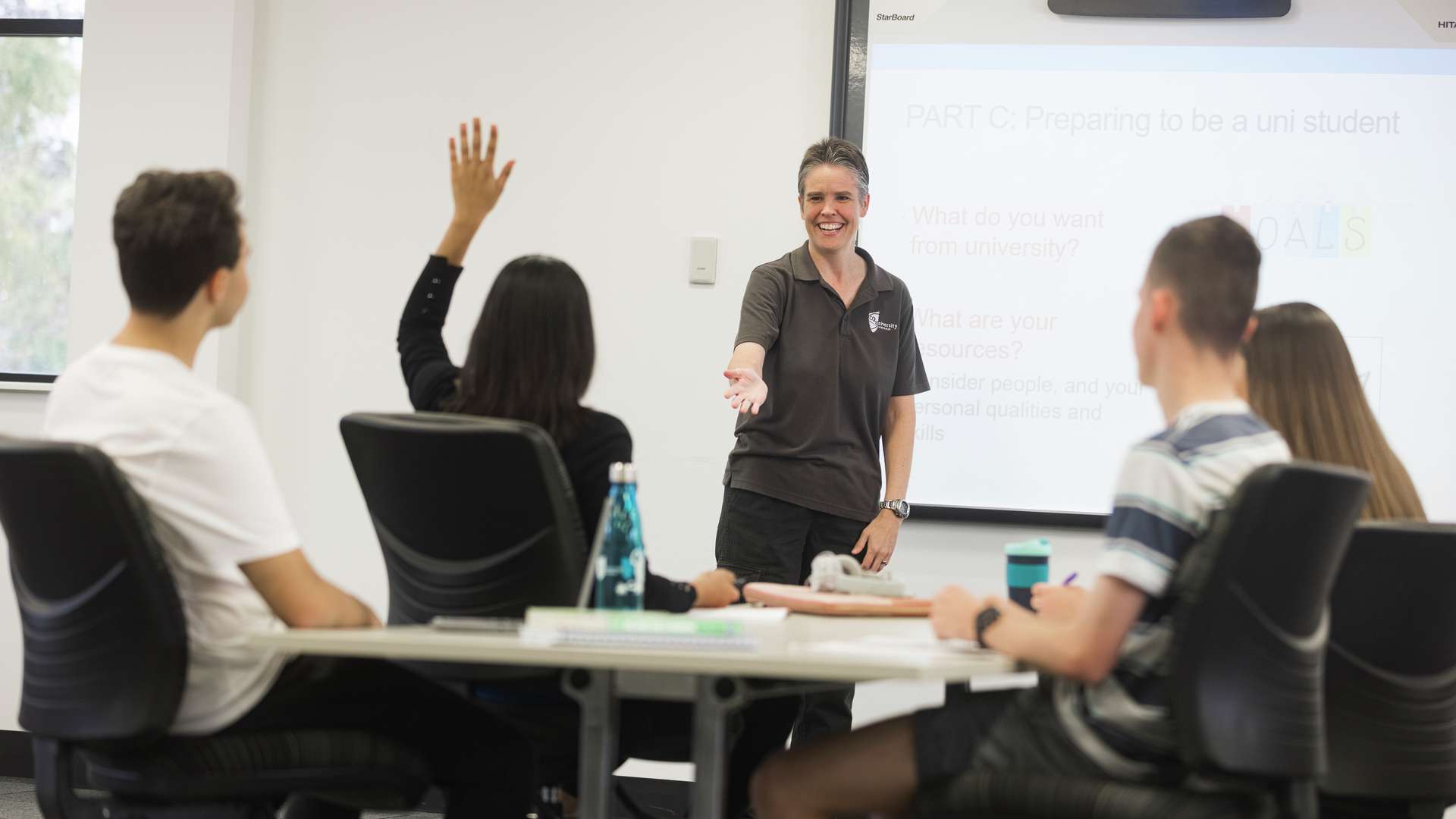
You’ll find a range of course options across different study levels at CQU, so understanding study levels before you start exploring courses can make your search easier. From general career fit to entry requirements and completion time, learn about the key differences between study levels as the first step.
If you’re looking to build your confidence before you start your studies or need to meet specific requirements to gain entry to your desired course, an entry pathway course is the ideal place to start.
Our options allow you to:
We also have entry pathway options if you are a high school student and want to get a head start on TAFE or uni.
Our TAFE certificates and diplomas are an ideal option if you are seeking a specific set of skills or qualification for the job you want.
These courses are generally shorter than university degrees and typically range from six to 18 months full time, or one to two years part time. They offer excellent employment opportunities and pathways to further study, with many supported by Queensland Government subsidies for eligible Queenslanders. To explore subsidy opportunities and check your eligibility, visit TAFE Subsidised Training.
Certificates I and II offer entry level study with a very basic introduction to the field of study chosen.
Certificates III and IV include more advanced knowledge and skills training to get you job ready – some can be completed as part of a traineeship or apprenticeship.
A diploma is another step up from a certificate IV, with more in-depth studies and assessments that can lead to more highly-skilled job outcomes or provide a pathway to further study.
For most certificate course options, the entry requirements include a Basic Key Skills Builder (BKSB) online literacy and numeracy assessment, with diploma courses requiring Year 12, Certificate IV or commensurate work experience in addition to the BKSB.
If you haven’t completed a university qualification, our undergraduate degrees are the ideal place to start for a wide range of career options and outcomes.
Our undergraduate diploma options allow you to explore a specific discipline in some depth and are also pathways to a number of associate or bachelor degrees. They have the same AQF level as our TAFE diploma options however, differences in fees, dates, practical experience, theory, pathways, and availability may apply depending on the course. Duration is typically one year full time or two years part time.
With our associate degree options, you will gain the skills and knowledge to qualify at the para-professional level and may also be eligible for credit to related bachelor degrees. Duration is typically two years full time or four years part time.
A bachelor degree is usually the first course studied at university and allows you to gain a solid understanding and strong skill set in your chosen field to begin or enhance a professional career. When coupled with other bachelor degrees, as a double degree, you’ll gain two qualifications in significantly less time than doing each degree separately. Duration is typically three to four years full-time (four to five years double degree), six to eight years part time.
An honours course is an additional year of study full time (or part time equivalent) after a bachelor degree – ideal if you wish to extend your knowledge in a chosen specialisation or continue to study a research higher degree. Some honours components are coupled with the bachelor allowing you to progress your studies seamlessly.
If you’re looking to progress in your career and have completed a bachelor degree, or for some of our courses have relevant professional experience, our postgraduate degrees will give you the advantage you need. A postgraduate degree can also be an option if you are wanting to change careers or gain a formal qualification for your existing skills and knowledge.
A graduate certificate provides the foundational knowledge in your chosen specialist area and typically consists of four units undertaken over six months full time or one year part time.
For more advanced capability and experience, and especially if you are seeking a new career direction, our graduate diploma options are eight units, often including elective options, undertaken one year full time or two years part time.
A masters degree is an advanced study option typically including 12 units undertaken up to two years full time or four years part time. They comprise of core, specialist and often elective units designed to extend your professional understanding or move into a new professional direction.
Many of our masters degrees offer interim and exit pathways allowing you to obtain a graduate certificate or graduate diploma should you need an earlier qualification or to discontinue study. Conversely, our postgraduate certificates and diplomas can be pathways, providing credit toward the next level of study.
We also offer a range of hyperflexible online postgraduate course options that allow you to study at your own pace with no assessment deadlines on our Be Different platform.
Our research higher degrees are renowned for their practical application and are not necessarily just for those who consider themselves academics. If you have a passion for a topic, want to solve problems in your industry or community, or are looking for a unique opportunity to stand out and advance your career, it's worth considering a Research Higher Degree (RHD).
Our research masters degrees include a program of supervised research and study in a particular area of interest, leading to the submission of a thesis that makes a contribution to knowledge. You can join an existing research project, or we have experts available to supervise your project in a wide variety of fields. Duration is typically undertaken two years full time or four years part time.
Our Doctor of Philosophy (PhD) is a course of supervised research and study that can be undertaken in a range of fields and also leads to a submission of a thesis that makes a significant contribution to knowledge.
Other doctoral degrees we offer include the Doctor of Philosophy (Industry), Doctor of Philosophy by Portfolio and Doctor of Education – each tailored to meet the needs of a specific industry, skills or experience.
Entry requirements to our RHD options differ but usually require at minimum an undergraduate level qualification and often subsequent postgraduate qualifications and/or commensurate work experience. We also offer a preparatory Graduate Certificate in Research to acquire advanced research skills and provide an alternate pathway for industry professionals to help satisfy the entry criteria for a research masters.
Our wide range of short courses and microcredentials provide hundreds of options for hobby, home improvement, work skills or professional development study. From hours to weeks, the duration of each course is dependent on the content. Upon completion you’ll receive a certificate and for microcredentials also a digital badge for shareable acknowledgement of your newly acquired skills.
The Australian Qualifications Framework (AQF) is the national policy for regulated qualifications in the Australian education and training system; it provides an integrated policy for which our qualifications meet.
Discover more about how our study-level options fit the AQF level criteria.
Ready to find the course for you, or want to explore more about study at CQUniversity?
CQUniversity Australia is a trading name of Central Queensland University
ABN: 39 181 103 288
RTO Code: 40939
CRICOS: 00219C
TEQSA: PRV12073

